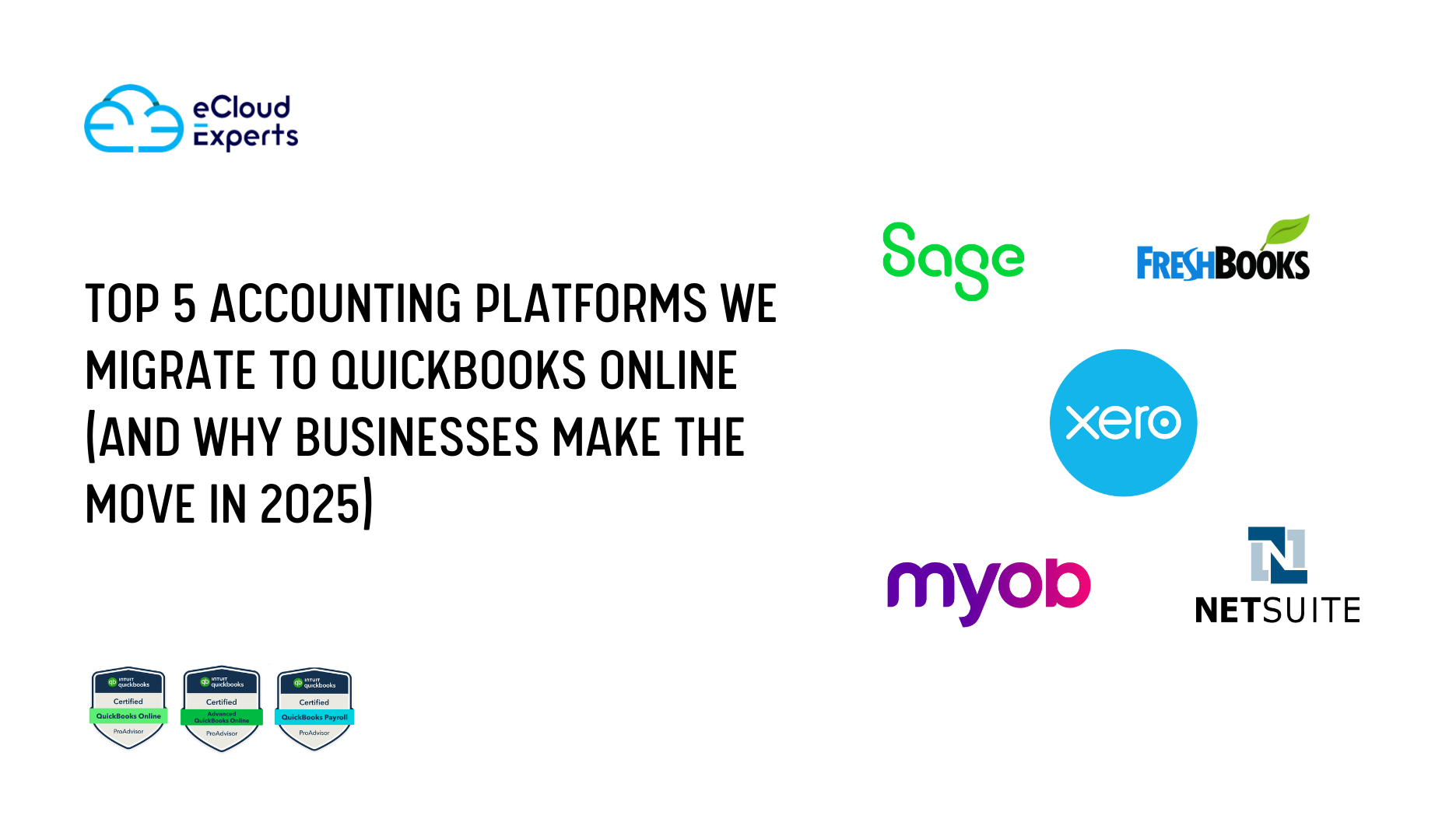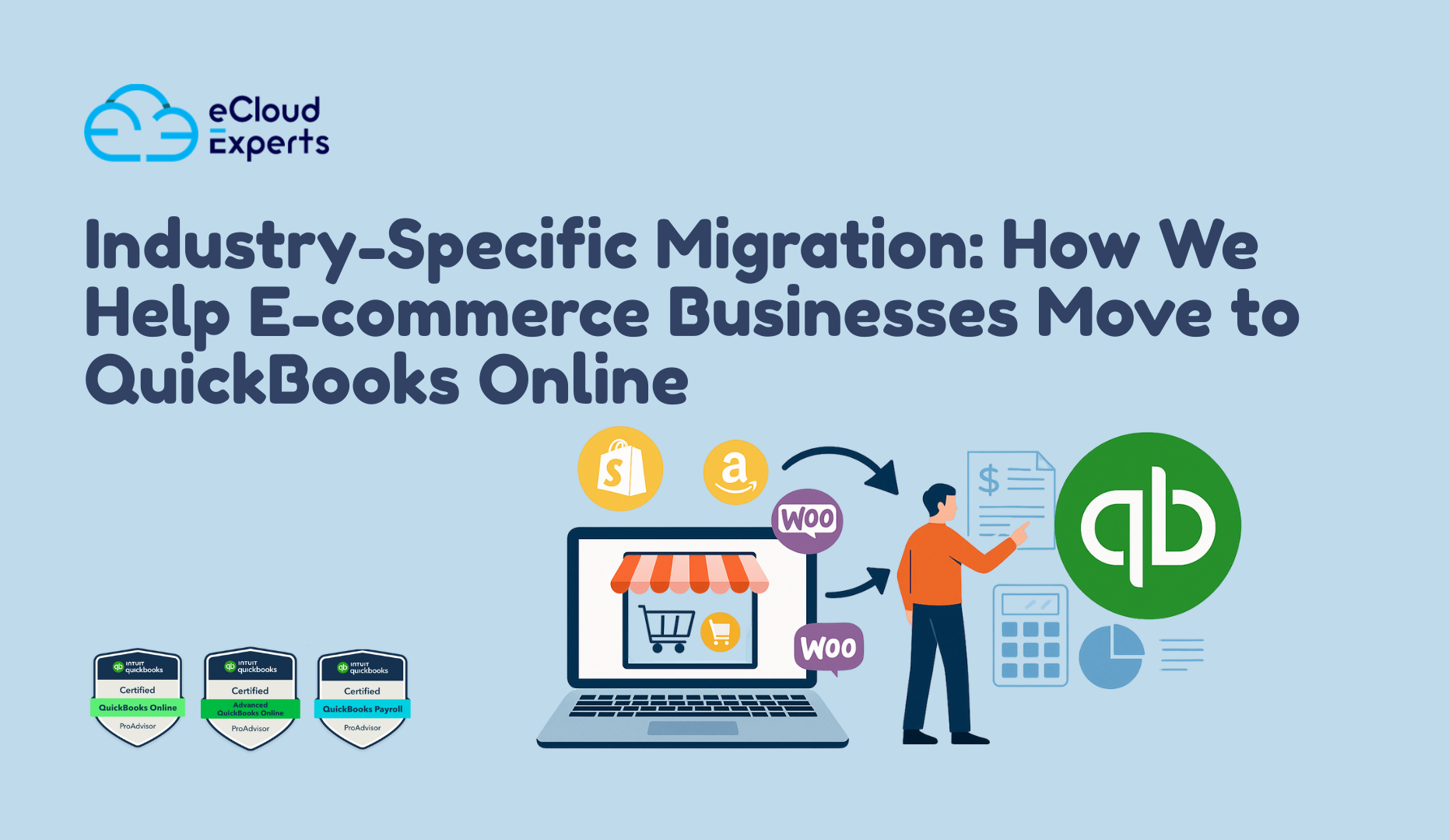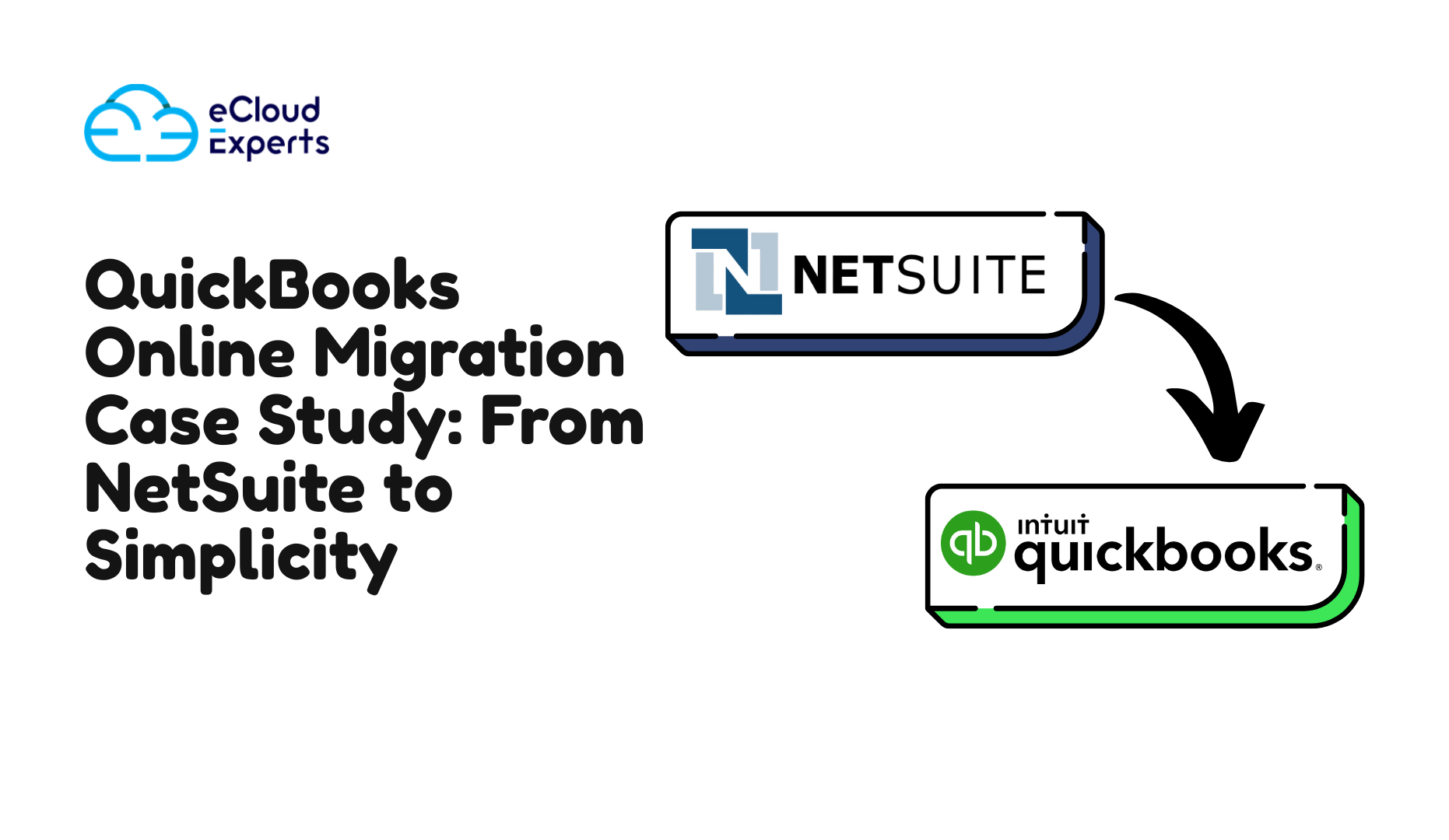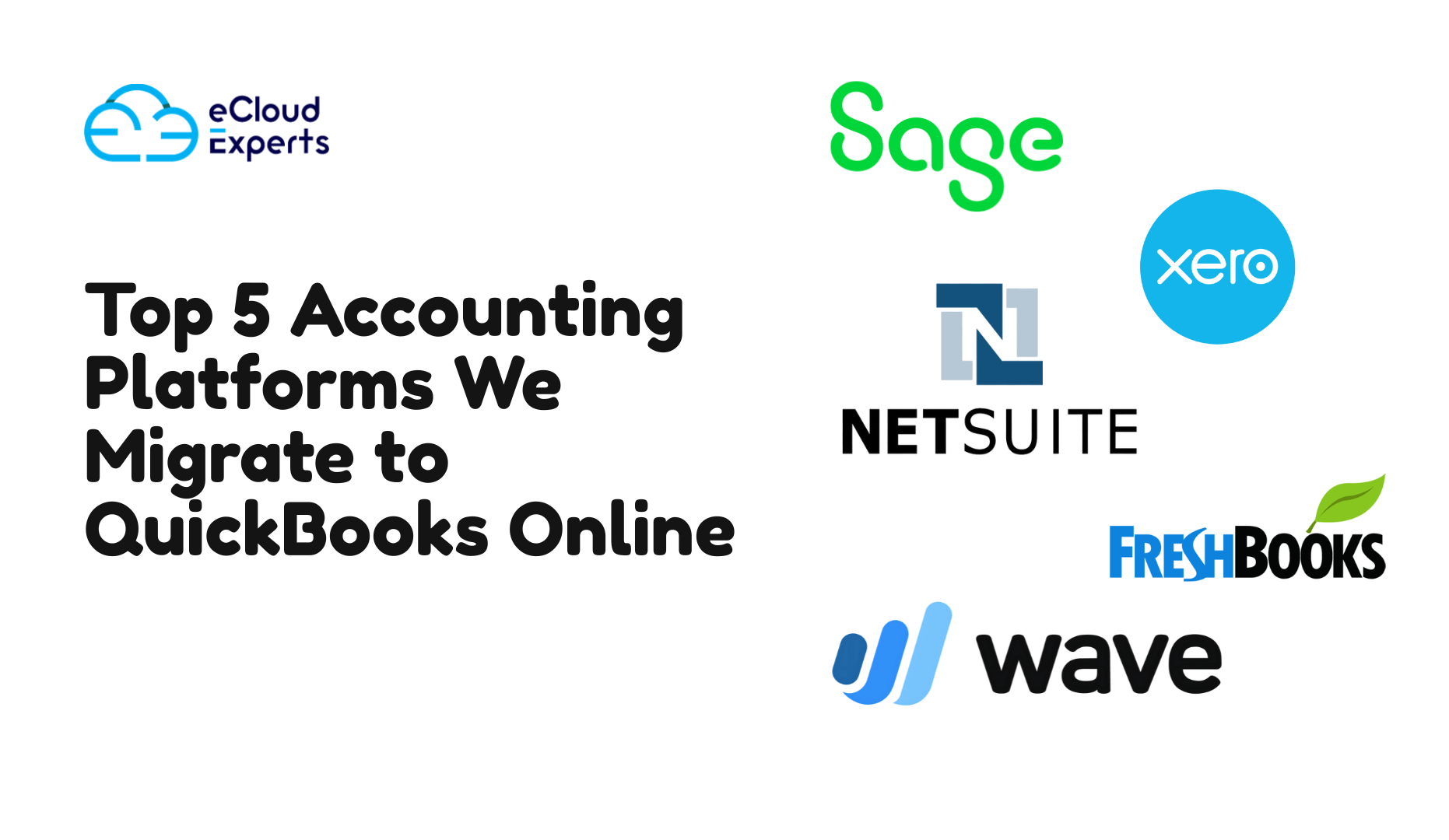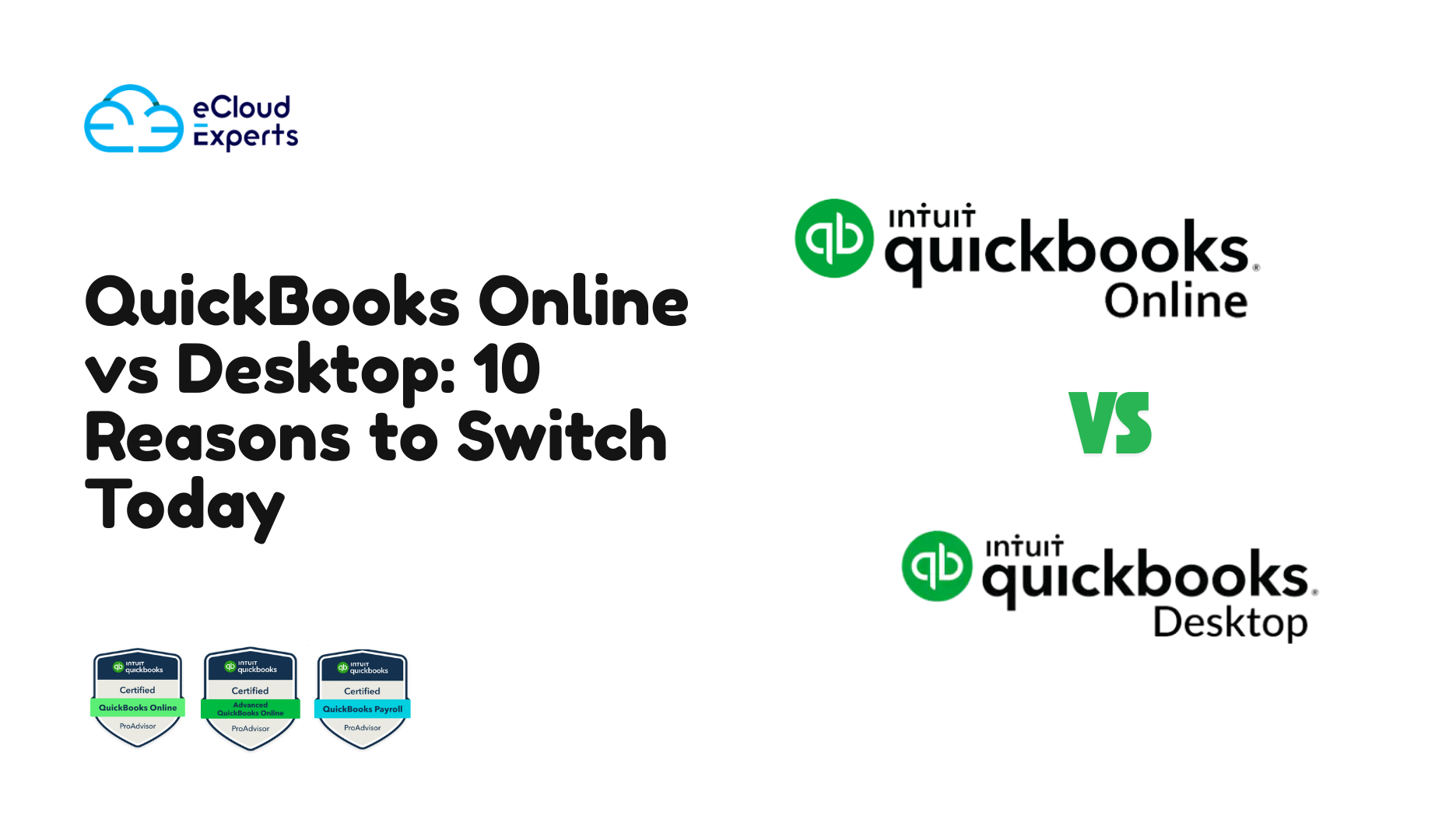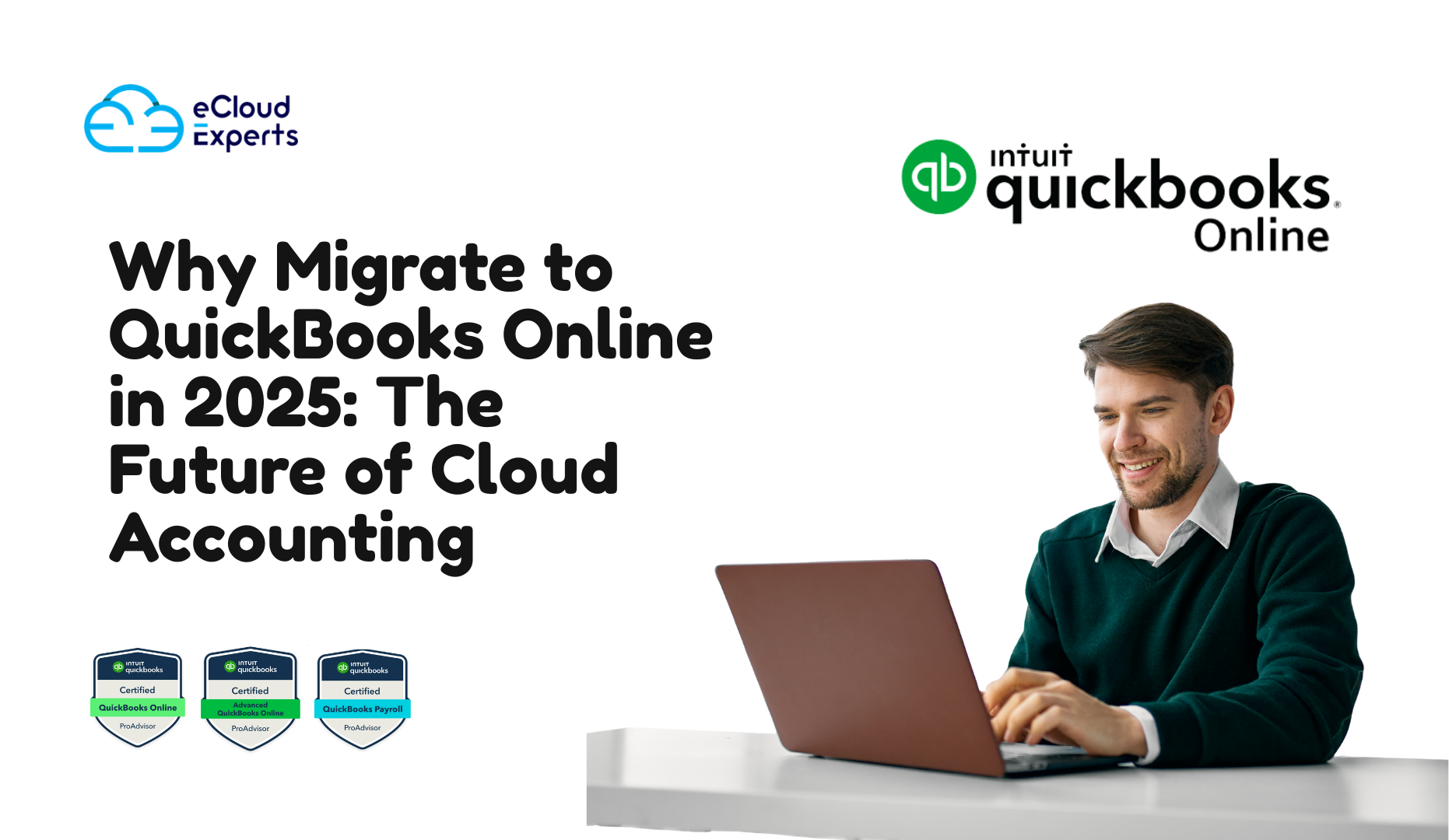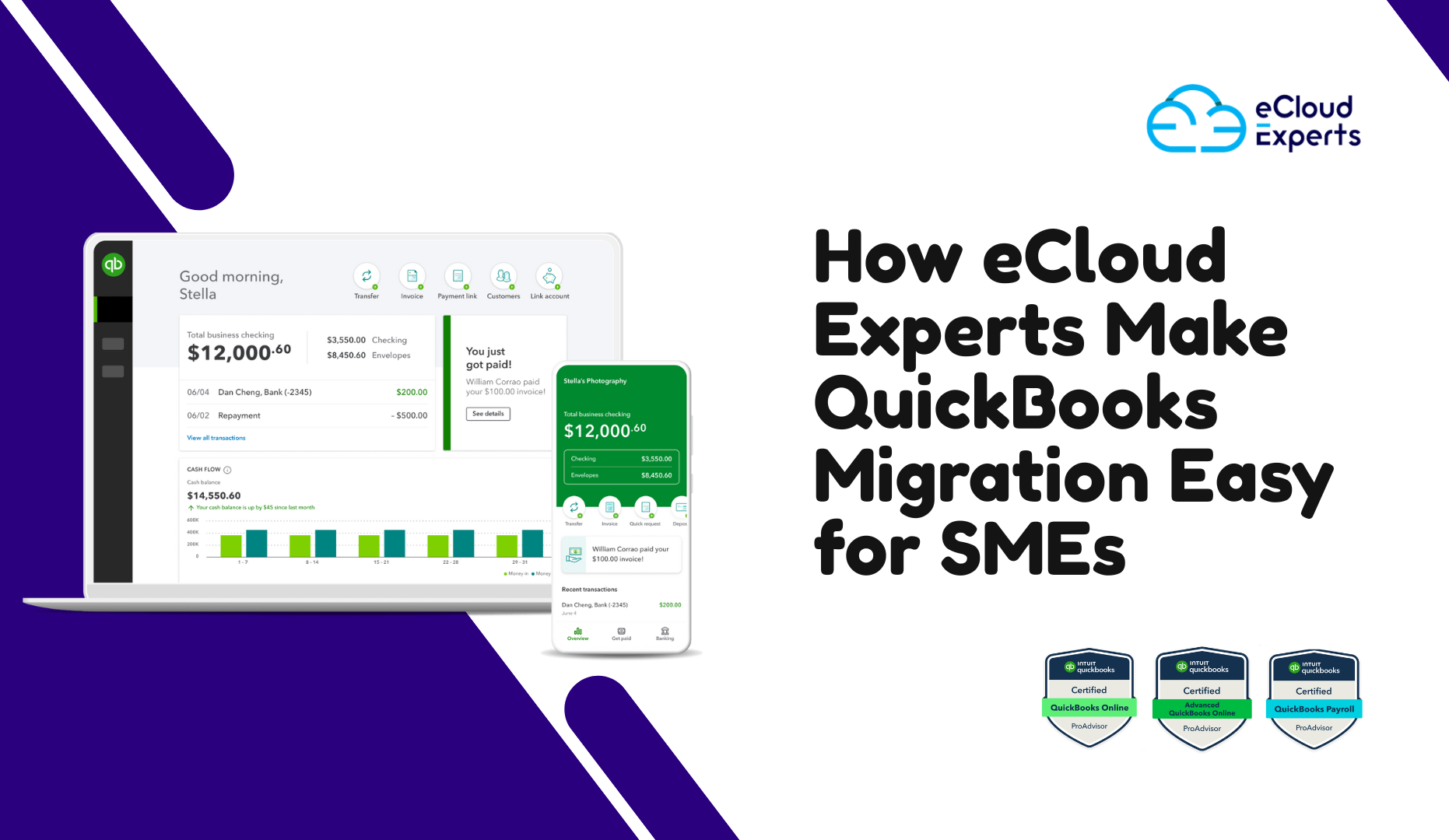Many business owners reach a point where their accounting system starts to hold them back. Reports take too long, the software feels old, or the cost doesn’t match the value anymore. That’s when they begin looking at QuickBooks Online migration as the next step.
In 2025, QuickBooks Online has become the go-to choice for growing businesses. It’s cloud-based, simple to use, and works well with banking, payroll, and ecommerce tools. More importantly, it gives owners a clear picture of their numbers at any time, from anywhere. That level of visibility is why so many companies choose to migrate to QuickBooks Online.
At eCloud Experts, we handle migrations every day. The five most common platforms we move to QuickBooks Online are Sage, Xero, NetSuite, MYOB, and FreshBooks. Each has its strengths, but many businesses eventually outgrow them or find that QuickBooks offers features that fit their next stage of growth.
In this blog, we’ll look at each of these five migrations in detail. We’ll explain why businesses make the switch, what challenges they face during the move, and how our team ensures the transition is accurate and stress-free. By the end, you’ll see why QuickBooks Online continues to be the leading choice for businesses ready to move forward in 2025.
Why More Companies Migrate to QuickBooks Online
One of the first things business owners notice about older accounting platforms is how limited they can feel. Reports are slow, updates cost extra, and working remotely is often difficult. That’s when many decide it’s time to look for a modern option and consider a QuickBooks Online migration.
QuickBooks Online is now one of the most widely used accounting platforms in the world. Here are a few reasons why so many businesses decide to migrate to QuickBooks Online:
- Work from anywhere – Owners and accountants can log in from the office, home, or while traveling. All you need is an internet connection.
- Automatic updates and backups – No more worrying about losing data or paying for upgrades. QuickBooks Online updates itself and saves information securely in the cloud.
- Integrations with other tools – Whether you use Shopify, PayPal, or payroll software, QuickBooks Online connects with hundreds of apps to make daily tasks easier.
- Real-time financial insights – Dashboards and reports update instantly, so you can make decisions based on the latest numbers instead of waiting for month-end.
- Future-ready features – Intuit, the company behind QuickBooks, continues to add improvements each year, keeping the system modern and competitive.
For many owners, these benefits are enough to justify the move. But every business has its own story, and the reasons to migrate often depend on the platform they are leaving behind. In the next sections, we’ll explore the top five migrations we handle at eCloud Experts: Sage, Xero, NetSuite, MYOB, and FreshBooks.
Sage to QuickBooks Online Migration
Many businesses start their journey with Sage. It has been around for decades and is trusted by accountants worldwide. But as companies grow, they often find Sage too complex or outdated for daily use. Owners want quick access to reports, flexible integrations, and an easier way to manage finances. That’s when a Sage to QuickBooks Online move becomes the clear choice.
One of the biggest reasons businesses leave Sage is cost. Licensing, updates, and support can add up. QuickBooks Online, by contrast, runs on a monthly subscription with updates and backups included. It’s not only easier to budget but also more predictable in the long run.
Another common challenge is user experience. Sage works well for trained accountants, but it can be difficult for business owners who just want to see how their company is doing. With QuickBooks Online, dashboards are simple, clean, and designed for non-accountants too.
The move itself can raise a few concerns. Sage and QuickBooks Online store information differently. Multi-currency setups, departments, and custom charts of accounts may not transfer directly. That’s where expertise matters. At eCloud Experts, we handle these issues by mapping the data carefully, testing reports, and making sure everything matches before going live.
A Sage to QuickBooks Online migration is more than just moving numbers from one system to another. It’s about setting up a system that supports growth, gives owners clear visibility, and reduces the headaches that come with outdated software.
Xero to QuickBooks Online Migration
Xero has built a strong reputation as a modern cloud accounting tool. Many startups and small businesses love it for its clean design and simple invoicing. But as companies grow, some owners discover that Xero no longer fits their needs. That’s when they start looking at a Xero to QuickBooks Online migration.
One reason for the move is advanced reporting. While Xero covers the basics, businesses that need deeper insights or industry-specific reports often find QuickBooks Online more flexible. Another reason is compliance. In regions like the United States, QuickBooks Online handles tax features that Xero doesn’t fully support. For businesses expanding internationally, these details make a big difference.
There are also practical reasons. Some teams want stronger integration with banking, payroll, or inventory tools. Others find that accountants and advisors in their area prefer working with QuickBooks, which makes collaboration smoother.
The migration itself can be tricky. Moving contact lists, past invoices, payroll data, and VAT records takes careful planning. If it’s not handled properly, there’s a risk of gaps in transaction history or mismatched balances. At eCloud Experts, we prepare by exporting data cleanly from Xero, importing it into QuickBooks Online with custom tools, and reconciling reports line by line.
A Xero to QuickBooks Online migration is often about preparing for growth. QuickBooks offers a platform that can handle multiple users, advanced tax setups, and integrations that help businesses scale. For many owners, that’s the step that takes them from a small business tool to a system built for the future.
NetSuite to QuickBooks Online Migration
NetSuite is known as a powerful enterprise system. Large companies use it for advanced ERP functions, from inventory to global operations. But for many growing businesses, NetSuite can feel overwhelming and too expensive to maintain. That’s when a NetSuite to QuickBooks Online migration starts to make sense.
The most common reason owners leave NetSuite is cost. Licenses, custom setups, and ongoing support quickly add up. QuickBooks Online, by contrast, offers a lower monthly fee without hidden extras. For small and medium-sized businesses, this makes budgeting much easier.
Another reason is usability. NetSuite is feature-rich, but those features often go unused by businesses that don’t need full ERP functions. QuickBooks Online focuses on the essentials—bookkeeping, invoicing, bank feeds, and reports—in a way that is easier for both owners and accountants to manage.
The migration itself can be complex. NetSuite stores huge volumes of data, with custom fields and detailed histories. Without proper planning, a move could lead to lost information or incomplete reports. At eCloud Experts, we handle NetSuite to QuickBooks Online projects in stages. We clean and map the chart of accounts, transfer historic data, and run tests to ensure balances line up. In some cases, we even run the two systems in parallel until the owner feels confident in QuickBooks.
For many businesses, moving from NetSuite to QuickBooks Online is not about losing power. It’s about choosing a system that matches their actual size and needs. QuickBooks Online provides flexibility, cost savings, and clarity—without the heavy layers that NetSuite demands.
MYOB to QuickBooks Online Migration
MYOB has been a popular choice for businesses in Australia, New Zealand, and the UK for many years. It works well for basic bookkeeping and payroll, but many owners eventually feel limited by its lack of flexibility. That’s when they begin considering a MYOB to QuickBooks Online migration.
One of the main reasons for switching is accessibility. MYOB desktop products often tie users to a single computer, while QuickBooks Online allows owners and accountants to log in from anywhere. This matters even more now, with remote work becoming the norm.
Another reason is compliance. Tax rules and payroll requirements change often, and many businesses find QuickBooks Online easier to keep up to date. QuickBooks also connects to a wider range of apps, from ecommerce stores to payment processors, giving growing companies more options to work smarter.
The migration itself has its challenges. Payroll setups, tax codes, and inventory lists don’t always match perfectly between the two systems. If these aren’t transferred correctly, it can create problems with employee records or future reporting. At eCloud Experts, we prepare each MYOB to QuickBooks Online project by reviewing the client’s data, cleaning it where needed, and testing the new setup to ensure everything works properly.
For many owners, this move isn’t just about leaving MYOB behind. It’s about upgrading to a system that’s modern, widely supported, and built to grow with their business. QuickBooks Online provides that flexibility while still keeping day-to-day accounting simple.
FreshBooks to QuickBooks Online Migration
FreshBooks is a great tool for freelancers and very small businesses. It makes invoicing simple and helps track expenses with ease. But as companies grow, many owners start to notice its limits. That’s when a FreshBooks to QuickBooks Online migration becomes the next step.
The main reason for switching is scale. FreshBooks works well for one-person businesses, but it struggles when multiple team members need access. QuickBooks Online allows many users to work together, with different permission levels for owners, managers, and accountants.
Another reason is reporting. FreshBooks provides basic summaries, but QuickBooks Online gives a much wider range of reports. Business owners can see profit and loss, cash flow, and even track performance by project or department. This kind of detail becomes essential as the business grows.
The move itself can bring challenges. FreshBooks data, such as recurring invoices, client lists, and time tracking, doesn’t always transfer directly. Without care, you could lose invoice numbering or important billing history. At eCloud Experts, we handle this by carefully mapping each client, invoice, and project into QuickBooks Online. We also test recurring invoices to make sure billing continues without interruption.
A FreshBooks to QuickBooks Online migration is often less about leaving FreshBooks behind and more about moving up. QuickBooks gives growing businesses the tools they need for payroll, integrations, and advanced reporting—all in one system that supports long-term growth.
Why Work With eCloud Experts for QuickBooks Online Migration
Moving your accounts from one system to another can feel like a big task. The risk of lost data, mismatched reports, or downtime is real. That’s why choosing the right partner matters when planning a QuickBooks Online migration.
At eCloud Experts, migrations are what we do every day. Our team has worked with businesses moving from Sage, Xero, NetSuite, MYOB, and FreshBooks, so we understand the unique challenges of each platform. We don’t just move the data—we make sure it’s accurate, tested, and ready for use in QuickBooks Online.
Here’s what sets us apart:
- Certified QuickBooks ProAdvisors with deep knowledge of accounting software.
- Step-by-step process: plan, prepare, migrate, and review—so nothing is left unchecked.
- Data accuracy: we map accounts carefully and run tests to make sure reports match.
- Post-migration support: once you’re live on QuickBooks Online, we help train your team and answer questions as they come up.
When you choose eCloud Experts, you’re not just getting a one-time transfer. You’re getting a trusted partner who cares about your long-term success with QuickBooks Online.
Conclusion
Switching accounting platforms is never a small decision. But for many business owners in 2025, QuickBooks Online is the clear next step. Whether you’re moving from Sage, Xero, NetSuite, MYOB, or FreshBooks, the goal is the same—better visibility, easier collaboration, and a system that grows with your business.
A QuickBooks Online migration is about more than moving numbers. It’s about choosing tools that make your life easier today and set your company up for the future. With features like cloud access, automatic updates, and real-time reporting, QuickBooks Online continues to be the platform that business owners trust.
At eCloud Experts, we make sure every migration is handled with care. From planning and testing to training and support, our team gives you confidence that your books are accurate and ready to use from day one.
If you’re ready to migrate to QuickBooks Online, now is the time to act. Book a free consultation with eCloud Experts and let’s talk about your business, your current system, and how we can help you make the switch with ease.

